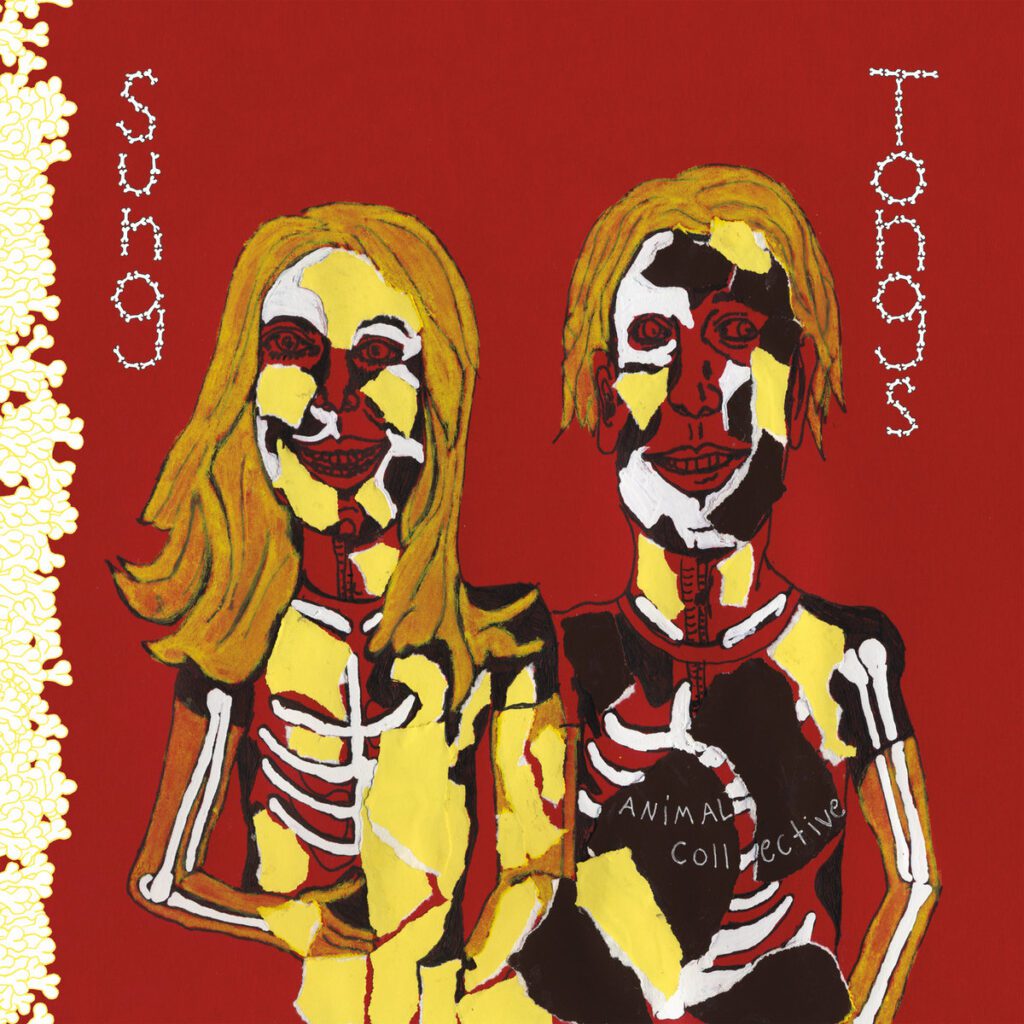
Of my 10 tattoos, I would only describe one as truly bad. It’s a smudged collection of lines that (sort of) make up the image of a human figure crying into its hand. It sits on the right side of my ribcage, which, at 19 years old, I learned the hard way is a painful spot to be hit with a needle for an hour. The mediocre rendering resembles the cover of Panda Bear’s 2011 album, Tomboy, less and less with each coming year. It’s not exactly a horrible tattoo — people can usually figure out what they’re looking at if I explain it very directly. But it hardly does justice to an album by an artist I love. Thirteen years ago, this very website proclaimed that Tomboy’s album art would “make a decent tattoo.” Yet here I sit, proving former Stereogum Executive Editor Amrit Singh’s headline wrong.
While I definitely wish I’d put more thought in before getting that ink as an airhead college sophomore, I wouldn’t trade the sloppy mark for the world; it’s hard to think of a band that has come to mean more to me over the years than Animal Collective. I grew up gigging in the Washington, DC all-ages hardcore scene. But the ever-present influence of Fugazi and Minor Threat never quite resonated. I am aware that this may be shocking news, coming from someone who is paid to write about heaps of ambient music each month. Instead, my hometown heroes were David Portner (Avey Tare), Noah Lennox (the aforementioned Panda Bear), Brian Weitz (Geologist), and Josh Dibb (Deakin), who make up Animal Collective. The DMV natives became distant role models for me as a high school outsider with a stronger fixation on attaining zen than dismantling the system.
For a long time, 2004’s Sung Tongs — released 20 years ago today — was my least favorite Animal Collective album. It’s gnarled and alien, like if Bob Dylan’s songs were forged in an alternate universe where the air tastes of lemon rind. It marks the turning point at which Animal Collective transitioned from being radical experimentalists to hypnagogic ponderers, and it was hard for me to wrap my head around this pivotal sound at first. The albums that came before Sung Tongs, like Danse Manatee and Ark, were brash and trebly — playing into a jagged, theatrical formula that was bubbling up from the early aughts Brooklyn underground. Post-Sung Tongs, Animal Collective warily embraced structure, honing a strain of masterfully unwound songwriting on Feels that carried over onto subsequent releases. I quickly became obsessed with the band after I checked out Merriweather Post Pavilion in the eighth grade. And, even at such a young age, I was perplexed by gritty footage I found of the act’s masked early shows on YouTube. But no matter how many times I gave it a spin, Sung Tongs never quite clicked for me as a kid.
Animal Collective albums feature unpredictable permutations of the quartet’s lineup. Sung Tongs is particularly stripped-down and came to life as a collaboration between Portner and Lennox. They holed up in Portner’s parents’ house in rural Lamar, Colorado, and recorded these 12 songs on a weathered Tascam 8-track. Doused in the glow of a red light bulb, the home itself frequently served as an instrument — many vocal takes were a product of messing with room acoustics, and a sample of a slamming door provides a backbone for the beat on “Kids On Holiday.” The record has a jammy quality, but it’s deceptively toiled over. Portner and Lennox would frequently record from mid-morning into the middle of the night.
Back on the East Coast, the duo tweaked those demos on laptops, digitally warbling takes and adding crunchy sound effects, with aid from longtime collaborator Rusty Santos. The final result is woozy and sparse — the aural equivalent of taking a feverish walk through nature, stumps and moss fading into a clammy, nauseating blur. The only other album I’ve heard that feels remotely similar is The Books’ creaky The Lemon Of Pink. But where that release calls to mind flower petals blowing on fragrant wind, Animal Collective’s freak-folk opus evokes what it might be like to gargle handfuls of mulch.
Listening to Sung Tongs, the first word that comes to mind is “brittle.” The record opens with a rushing sound effect on “Leaf House,” before acoustic guitars and percussion emerge to support spooky voices and guttural shrieks. The cartoonish second track, “Who Could Win A Rabbit,” maintains the energy. It rolls back the curtain on an undulating sample of a man talking about the newspaper, which devolves into an unoiled, earthy arrangement that lurches between disparate sections. “Sweet Road” is peppy, thanks to a perky guitar riff and muffled vocals. “It started like a stone/ I grew it out but then I rested it/ I found sweet road/ It came announced on the right/ I left my purse then found the road,” Portner and Lennox duet on the chorus. It’s fitting that the sprightly song was later used in a commercial for Crayola crayons.
The most playful moment on the record comes with “College,” which has had its simple refrain become something of a mantra among members of Animal Collective fan forums. For 40 seconds, goopy harmonies rest atop a gravely field recording. “You don’t have to go to college,” the duo eventually sing together on the song’s only intelligible line, cheekily drawled right before the track cuts off. Clocking in at just under one minute, it’s the first Animal Collective track that feels outwardly indebted to the Beach Boys — an influence that would become unignorable on later endeavors.
For the most part, though, Sung Tongs is a fairly subdued record — Portner and Lennox have cited minimal techno as a surprising source of inspiration. It’s the last album I’d ever recommend putting on at the club, but it definitely has a sprawling, ethereal undertone. This softness defines the 12-minute “Visiting Friends,” which is centered on rattly chords, whispered voice snippets, and wah-wah’d melodies generated from some indecipherable source. Closer “Whaddit I Done” plays like it’s bobbing in and out of salty waves, Portner’s filtered words punctuated by Lennox’s distinct, full-bodied intonations. “Mouth Wooed Her” is especially dynamic, opening with firm strums that devolve into a loopy, nonsensical outro. “I need mouth water,” Portner coos in a childlike voice, before the instrumental gradually lulls itself to silence. From start to finish, Sung Tongs plays like some whimsical yet grotesque folk tale. With eyes closed, it’s easy to imagine the record as a psychedelic tapestry, depicting a zoomed out view of everyday life in an ill-fated woodland village. Listening to Sung Tongs can be like reading Little Red Riding Hood, as told from the perspective of the wolf.
While the record’s themes are frequently interpreted as youthful and naive, Sung Tongs pulls from day-to-day experiences as a 20-something in the city. “That’s where songs like ‘Winters Love’ and some of the more upbeat ‘Who Could Win A Rabbit?’ tunes come from. Feeling good and living in New York in those days. I lived in Crown Heights and really enjoyed it there. A lot of that is what it’s about, for me,” Portner told Austin publication Do512 in a 2017 interview. Later in the conversation, he goes on to describe Sung Tongs as “moody.” How an album shaped by the uncertainty of young life in a fast-paced mecca of partying ended up playing like a melted cassette recording of a six-year-old’s birthday party is beyond me. But this inexplicable outcome pinpoints the crypticism that makes Animal Collective’s lyrics so endlessly fascinating to dive into.
Sung Tongs was met with a bold acclaim that helped thrust Animal Collective out of DIY spaces and onto the main stage. “Despite its eclecticism and relatively Dadaist leanings, Sung Tongs is a romantic album; romantic in its celebration of innocence and nonsensical shared knowledge, and the sweet, trusted idea that everything will be fine,” Dominique Leone wrote in a glowing Pitchfork review. Bestowed with a high rating of 8.9, it was the first Animal Collective release to receive an influential Best New Music designation — an honor that, at the time, had the power to place a band on the accelerated path to indie stardom. Sung Tongs went on to land at #2 on Pitchfork’s list of the Top 50 Albums of 2004, and was placed at #49 on Stereogum’s roundup of the Best Albums Of The 2000s.
“While the intervening years have elevated Sung Tongs to a touchstone of New York indie music, it remains a deeply weird album. The songs don’t unfold quite like you expect them to, often diverting off course, carried off by their own exuberance,” wrote Andy Beta in a 2017 article for Vulture. He was reflecting on Portner and Lennox’s first proper live performance of the album, at Pitchfork’s 21st anniversary party in Brooklyn. Shortly after that celebrated night, Animal Collective announced a somewhat random, albeit welcome tour, playing Sung Tongs in full. Over the summer of 2018, Portner and Lennox managed to pack major theaters around the world, in support of a batch of songs that had come out 14 years prior. Looking back, it emphasizes the record’s enduring status as a beloved cult favorite.
I personally don’t believe that Sung Tongs is the best Animal Collective record. Uncontroversially, Feels, Strawberry Jam, and Merriweather Post Pavilion are all tied at #1 for me. But revisiting Sung Tongs is an exercise in nostalgia, an affirmation of the maturation that can happen over the course of young adulthood. It takes me back to the middle school winter I spent staying up late, pouring over back issues of Under The Radar Magazine, forcing myself to appreciate experimental music because blogs I was too young to be reading dictated that I had to. It reminds me of bonding with my college ex over missing the East Coast music scene; it’s also the record that soundtracked our tough breakup a few months later. It’s an album that spurred me to take the train from San Francisco to Oakland after my unpaid internship let me off, to catch the Sung Tongs reunion tour in 2018. It also forced me to blow a measly paycheck I earned bouncing venues on the only three-sizes-too-large sweatshirt left at the merch table, later that night.
Is “The Softest Voice” the Animal Collective song I sloppily pull up coming home from a long night out, pondering life? Hell no, that honor goes to “Banshee Beat” every single time. Will I put “Winters Love” on my wedding playlist? Probably not. However, “In The Flowers” will almost certainly make the cut. But Sung Tongs has unwittingly scored massive chunks of my young life. Because of that, I cherish it more every time I press play.
A few months ago, I was house sitting for a friend in a rural corner of the Hudson Valley. The trees were brown, the cloudless sky was a particularly frigid shade of blue, and dead cattails swayed limply over icy river water. I remarked to my partner that, five years prior, I would have found these surroundings incredibly dismal. But as I’ve gotten older, I’ve learned to find great amounts of beauty in prickly starkness. Putting on Sung Tongs transports me to a comparable place. It’s skeletal and barren and primal, like some prehistoric ritual captured to tape. It bristles with a warm magic that can only arise when a few good friends pack up some instruments and trek out to the middle of nowhere to make a weird ass record.



